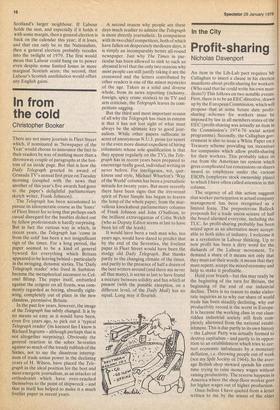In from the cold
Christopher Booker
There are not many journals in Fleet Street which, if nominated as 'Newspaper of the Year' would choose to announce the fact to their readers by way of nothing more than a throwaway couple of paragraphs at the bottom of an inside page. But that is how the Daily Telegraph greeted its award of Granada TV's annual first prize on Tuesday morning (coupled with the news that another of this year's five awards had gone to the paper's delightful parliamentary sketch writer, Frank Johnson).
The ,Telegraph has been accustomed to pursue its idiosyncratic course as the 'loner' of Fleet Street for so long that perhaps such casual disregard for the baubles dished out by fellow professionals is hardly surprising. But in fact the curious way in which, in recent years, the Telegraph has 'come in from the cold' has been a not insignificant sign of the times. For a long period, the paper seemed to be a kind of general byword for everything which Britain appeared to be leaving behind—particularly in the swinging, dynamic sixties. The 'Daily Telegraph reader' who lived in Surbiton became the metaphorical successor to Colonel Blimp. The paper itself, embattled against the zeitgeist on all fronts, was commonly regarded as boring, absurdly rightwing, completely out of place in the new classless, permissive Britain.
In the past few years, however, the image of the Telegraph has subtly changed. It is by no means so easy as it would have been, even five years ago, to pick out a 'typical Telegraph reader' (its keenest fan I know is Richard Ingrams — although perhaps that is not altogether surprising). Obviously the general reaction in the sober Seventies against so much of the trendy rubbish of the Sixties, not to say the disastrous interregnum of trade union power in the declining years of H. Wilson, have placed the Telegraph in the ideal position for the best and most energetic journalism, as an attacker of orthodoxies which have over-reached themselves to the point of shipwreck — and that in itself has helped to make it a much livelier paper in recent years.
A second reason why people are these days much readier to admire the Telegraph is more directly journalistic. In comparison with its two chief competitors, both of which have fallen on desperately mediocre days, it is simply an incomparably better all-round newspaper. Just why The Times in particular has been allowed to sink to such an abysmal level that the only two reasons why most people can still justify taking it are the crossword and the letters contributed by other readers is one of the minor mysteries of the age. Taken as a solid and diverse whole, from its news reporting (industry, foreign, spicy crime stories) to its TV and arts criticism, the Telegraph leaves its competitors sagging.
But the third and most important reason of all why the Telegraph has risen in esteem is that it has not lost sight of what must always be the ultimate key to good journalism. While other papers suffocate in acres of anonymous N.U.J. prose (or resort to the even more dismal expedient of hiring columnists whose sole qualification is that they appear regularly on the TV), the Telegraph has in recent years been prepared to encourage really good, individual writing as never before. For intelligence, wit, quirkiness and style, Michael Wharton's 'Way of the World' column has been a journalistic miracle for twenty years. But more recently there have been signs that the irreverent spirit of Peter Simple has begun to leaven the lump of the whole paper, from the marvellous knockabout parliamentary columns of Frank Johnson and John O'Sullivan, to the brilliant extravaganzas of Colin Welch (who as Deputy Editor seems at last to have been let off the leash).
It would have been a rash man who, ten years ago, would have dared to predict that by the end of the Seventies, the liveliest paper in Fleet Street would have been the stodgy old Daily Telegraph. But thanks partly to the changing climate of the times, and partly to the presence of half a dozen of the best writers around (and there are never all that many), it seems at last to have found a mixture between solidity and fun which at present (with the possible exception, on a different level, of the Daily Mail) has no equal. Long may it flourish.


































 Previous page
Previous page